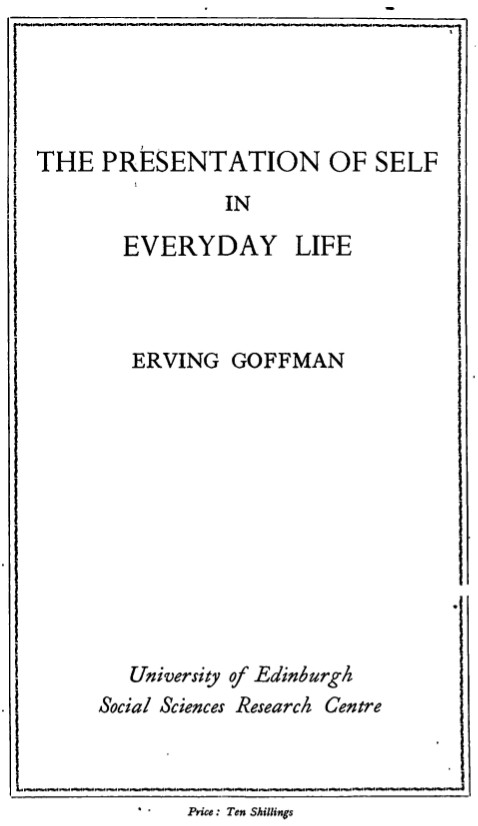Marcel Mauss: The Gift: Forms and Functions of Exchange in Archaic Societies (1925–) [FR, EN, DE, RO]
Filed under book | Tags: · anthropology, antiquity, gift, gift economy, myth, potlatch, society, sociology

“The Gift is a short book by the French sociologist Marcel Mauss and is the foundation of social theories of reciprocity and gift exchange.
It is perhaps the first systematic study of the custom, widespread in primitive societies from ancient Rome to present-day Melanesia, of exchanging gifts. The gift is conceived as a transaction forming part of all human, personal relationships between individuals and groups. These gift exchanges are at the same time moral, economic, juridical, aesthetic, religious, mythological and social phenomena.
The Gift has been very influential in anthropology, where there is a large field of study devoted to reciprocity and exchange. It has also influenced philosophers, artists and political activists, including Georges Bataille, Jacques Derrida and more recently the work of David Graeber.”
French edition
Essai sur le don: Forme et raison de l’échange dans les sociétés archaïques
Publisher Librairie Félix Alcan, Paris, 1925
157 pages
via Gallica
English edition
Translated by Ian Cunnison
With an Introduction by E. E. Evans-Pritchard
Publisher Cohen & West, London, 1966
130 pages
Another English edition
Translated by W. D. Halls
With a foreword by Mary Douglas
Publisher Routledge, London/New York, 1990
ISBN 041526748X
200 pages
New English edition
Edited, annotated and translated by Jane I. Guyer
Foreword by Bill Maurer
Publisher Hau Books, Chicago, 2016
ISBN 9780990505006
248 pages
Essai sur le don (French, 1923-24/1925)
The Gift (English, 1966)
The Gift (English, 1990)
Die Gabe (German, added on 2014-2-6, DJVU)
Eseu despre dar (Romanian, trans. Silvia Lupescu, 1993; new edition, 1997, added on 2013-6-3, via sorin, updated on 2019-6-10)
The Gift: Expanded Edition (English, trans. Jane I. Guyer, 2016, added on 2016-4-24, updated on 2019-6-10: removed from Open Access by publisher)
Harry Collins: Tacit and Explicit Knowledge (2010)
Filed under book | Tags: · actor-network theory, knowledge, language, meaning, neural networks, prosthesis, society, sociology, sociology of science, tacit knowledge

“Much of what humans know we cannot say. And much of what we do we cannot describe. For example, how do we know how to ride a bike when we can’t explain how we do it? Abilities like this were called “tacit knowledge” by physical chemist and philosopher Michael Polanyi, but here Harry Collins analyzes the term, and the behavior, in much greater detail, often departing from Polanyi’s treatment.
In Tacit and Explicit Knowledge, Collins develops a common conceptual language to bridge the concept’s disparate domains by explaining explicit knowledge and classifying tacit knowledge. Collins then teases apart the three very different meanings, which, until now, all fell under the umbrella of Polanyi’s term: relational tacit knowledge (things we could describe in principle if someone put effort into describing them), somatic tacit knowledge (things our bodies can do but we cannot describe how, like balancing on a bike), and collective tacit knowledge (knowledge we draw that is the property of society, such as the rules for language). Thus, bicycle riding consists of some somatic tacit knowledge and some collective tacit knowledge, such as the knowledge that allows us to navigate in traffic. The intermixing of the three kinds of tacit knowledge has led to confusion in the past; Collins’s book will at last unravel the complexities of the idea.
Tacit knowledge drives everything from language, science, education, and management to sport, bicycle riding, art, and our interaction with technology. In Collins’s able hands, it also functions at last as a framework for understanding human behavior in a range of disciplines.”
Publisher University of Chicago Press, 2010
ISBN 0226113809, 9780226113807
xiv+186 pages
Reviews: Alan Warde (Sociological Review, 2010), Massimo Mazzotti (Isis, 2011), Wiebe E. Bijker (Technology & Culture, 2011), Stephen P. Turner (Studies in History and Philosophy of Science, 2011), Park Doing (Social Studies of Science, 2011), Joseph Agassi (Philosophy of Social Sciences, 2013).
Commentary: Philosophia Scientiae (Léna Soler, Sjoerd D. Zwart et al., 2013).
Erving Goffman: The Presentation of Self in Everyday Life (1956)
Filed under book | Tags: · everyday, life, social theory, sociology, theatre

“The Presentation of Self in Everyday Life is a seminal sociology book by Erving Goffman. It uses the imagery of the theatre in order to study human behavior in social situations and the way we appear to others. Discussions of social techniques are based upon detailed research and observation of social customs in many regions.”
Publisher University of Edinburgh, 1956
162 pages

